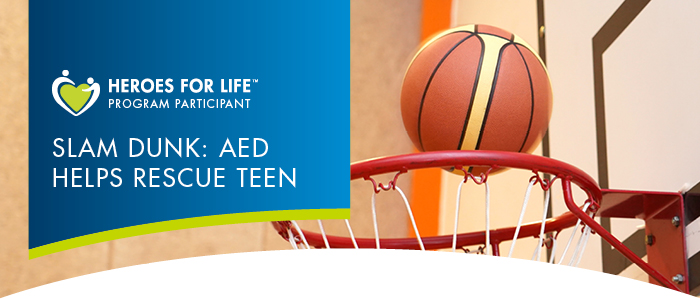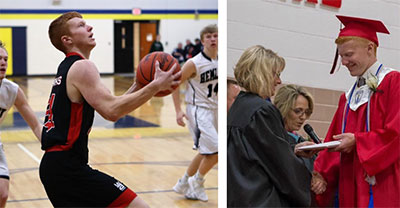
When Officer Matthew Van Hall was dispatched to St. Louis Middle School, in St. Louis, Michigan, on a Friday evening for a cardiac arrest, he assumed he'd be rescuing an adult. Instead, he discovered 16-year old high school junior Maverick Giles, who had collapsed during basketball practice.
"The basketball team was in the hallway, crying. That just didn't seem right, and a million other thoughts went through my head. As I turned the corner I saw that it was a kid, and it was obvious he wasn't doing well," says Officer Van Hall.
Earlier that day, Maverick felt fine. He did some weightlifting and warmups without any issues. That all changed during basketball practice. "We were running some drills. I came off the court and leaned against the wall to get a drink of water, and I collapsed. I don't recall anything else that happened," says Maverick.
Team effort
Basketball Coach Dan Nealy heard the thud of Maverick falling to the floor and came to his side. Recognizing the signs of sudden cardiac arrest (SCA), Coach Nealy immediately began performing CPR on Maverick while another coach called 911. Meanwhile, one of the players called his father—the assistant chief of the fire department—who had just left the school. When Assistant Fire Chief Dick Prestage arrived on the scene, he took over CPR for Nealy.
Before Coach Nealy could retrieve the school's automated external defibrillator (AED), police officers Van Hall and Sarah Chamberlain arrived with the ZOLL® AED Plus defibrillator that they keep in their patrol car for emergencies just like this.
"There was a lot of chaos. Kids were running around crying and screaming, but we were able to stay calm and get the AED pads on," says Officer Van Hall.
The AED Plus administered a shock, but Officer Van Hall could see that Maverick was still struggling to breathe. After a second shock and more chest compressions, Maverick's heart resumed beating, and he started to regain consciousness.
“No one is immune from a cardiac event—no matter your age or your health history.” – Matthew Van Hall, St. Louis Police officer
"That was the first time I'd ever used an AED on someone Maverick's age," Officer Van Hall says. "No one is immune from a cardiac event—no matter your age or your health history." Maverick had no heart health history whatsoever. Officer Van Hall noted that if their police department had not had the AED, Maverick probably would not have survived. "In those moments, time is precious. You have to get that AED and that shock. CPR will sustain someone for a long time, but it's the shock that will bring them back."
Recovery rebound
While being transported to Helen DeVos Children's Hospital in Grand Rapids, Maverick regained consciousness again. "I woke up and had no idea what was going on. I asked the guy and he just said, ‘We're making sure you're safe, buddy.' My dad was there. I told him I love you, and I was out again," recalls Maverick.
The next time Maverick woke up he was fully awake, and visitors surrounded his hospital bed. "I still had no clue what had happened yet," he says. He later learned that he had suffered SCA, but his doctors were unsure what caused it. They discovered that he has a heart mutation, but there's no indication that is what caused it to stop beating properly during his practice. Before being released from the hospital, Maverick was given an implantable cardioverter-defibrillator.
Full-court press
Maverick missed the majority of that basketball season while recovering, but he has had no problems since. Today, he plays in a recreational basketball league without any restrictions and attends Ferris State University in Big Rapids, Michigan.
“In those moments, time is precious. You have to get that AED and that shock. CPR will sustain someone for a long time, but it's the shock that will bring them back.” – Matthew Van Hall, St. Louis Police officer
|
"Thanks to some very quick thinking by Coach Nealy, and the officers getting there so quickly with the AED, my life was saved," Maverick says. "I am forever grateful to these people and very thankful and blessed!" Maverick's close call speaks to the importance of having AEDs readily available in schools, police cruisers, and other public places. Thanks to the teamwork and immediate response of Coach Nealy and the others in the gym that night—as well as the AED in the police officer's patrol car—Maverick's story has a happy ending. |

Thanks to quick thinking, teamwork, and an AED, Maverick is back in action. |
